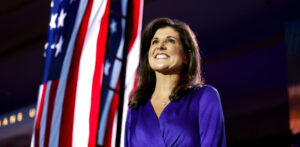As a steroidal colossus towering over his peers, Dwayne “The Rock” Johnson bestrides the barren expanse of modern celebrity like no other. His influence is unrivalled, spanning the realms of professional wrestling, corporate behemoths and, as his brief cameo at this year’s Oscars ceremony testified, even Hollywood.
Yet beneath the superficial sheen of this success, one finds a paradox: Johnson, once celebrated for the originality and raw charisma of his wrestling character, has spent the past two decades navigating a career marked by sterile blandness. Even in a marketplace brimming with astroturfed celebrities, Johnson’s deliberate brand-construction is remarkable. Unlike fellow ubiquitous megastars — see Taylor Swift — he has managed to earn billions without generating even a single news cycle’s worth of controversy, hot takes, and “discourse”.
This is, of course, nothing to be sniffed at. Johnson now showcases a fatless, hairless and thoroughly hyper-masculine physique that far surpasses what he achieved in his youth, during his days as a college football player or as a young wrestling icon. Such hyperbolic musculature normally invites speculation, yet Johnson’s vehement denial of steroid use has largely gone unquestioned. Somehow, he is both the most jacked human to ever front action movies — far larger than Arnold Schwarzenegger in his prime — and one of the least interrogated. It’s as if his massive size renders him invisible, the perfect cover for selling the self-as-content in this latest stage of capitalism.
In a similar vein, despite being hailed as one of Hollywood’s premier stars, Johnson’s solo drawing power remains startlingly nebulous. His most lucrative cinematic ventures, notably the Fast & Furious series, are ensemble pieces, while his foray into the superhero genre with the DCU’s Black Adam (2022) was a resounding dud. Only in a pair of critically panned roles in Southland Tales (2006) and Pain & Gain (2013) — in which he plays an anxiety-riddled actor and an anxiety-riddled bodybuilder respectively — does his capacity for depth and nuance emerge. Perhaps such feckless characters represent his truest self; it would explain why his attempts at gravitas and bravado have always fallen short.
The prolific nature of Johnson’s career further complicates the narrative. His relentless output — from film projects to business ventures such as the acquisition and merger of two minor spring American football leagues — paints a picture of a man in constant motion. Yet his relentless productivity, while admirable, often feels devoid of the originality and vibrancy that defined his first half-decade as a pro wrestler. Once someone who defined wrestling’s “attitude” for an entire generation, he now struggles to define anything. Even the occasional calls for him to run for president are met with lukewarm bipartisan support solely because so little is known about him; when, for instance, he appeared at the 2000 Republican National Convention, he spoke about the importance of voting.
One might think, then, that Johnson’s wrestling heritage, arising from the storied Anoa’i family that has produced dozens of all-time greats, would add a much-needed layer to his persona. Yet while his career undoubtedly benefits from nepotism — both his grandfather Peter Maivia and his father Rocky Johnson were major stars — his mainstream success outside of wrestling has been carefully curated to transcend specific cultural or racial identities, positioning him as a universal symbol of success and appeal. This strategy, however, while effective in broadening his audience, has only diluted the authenticity of his connection to his roots and the wrestling community.
Perhaps blind to this, the recent build-up to April’s signature WrestleMania premium live event — the largest pro wrestling show of the year — features Johnson confronting fellow second-generation star Cody Rhodes while simultaneously flaunting his heritage as the head of the WWE’s true royal “Bloodline”. This narrative, engaging as it may be, highlights the constructed nature of his public persona, blurring the lines between the authentic and the performative, the personal and the corporate. It raises the question of whether Johnson’s engagement with his cultural identity and the wrestling world is driven by a genuine connection or, now that he serves on the board of directors of TKO (which owns WWE), merely another role to be played in the grand narrative of a career devoted to the ruthless acquisition of money.
Some might retort that Johnson is simply embracing a narrative of success, but this masks a deeper, more troubling reality: his evolution is emblematic of the rise of the hyper-manufactured star, devoid of any distinguishing features that could tether them to a definable identity or cultural lineage. And while it may prove lucrative, there are obvious pitfalls: his deliberate positioning as a post-racial, cross-genre juggernaut not only obscures his own cultural heritage but also reinforces the problematic notion that true mainstream success requires a dilution of one’s ethnic and cultural specificity. In striving to be all things to all people, Johnson inadvertently perpetuates a homogenised vision of celebrity that prioritises palatability over authenticity, a troubling precedent for a society grappling with issues of representation and identity, from “pronouns in bio” social-media posting to corporate DEI training and the backlash to both.
Moreover, the relentless expansion of Johnson’s brand across various media and industries exemplifies a capitalist ethos run amok, where every facet of one’s life and identity is commodified and leveraged for maximum profit. This commodification of self is not unique to Johnson, but his case does represent a broader trend where public figures are expected to be endlessly consumable and completely anodyne, their value measured by their marketability rather than their lasting contributions to the cultural landscape. The result is a celebrity culture saturated with figures who, despite their omnipresence, offer little in the way of meaningful engagement or artistic innovation.
We can even witness this sacrifice of culture for the sake of spectacle in Johnson’s sporting activities elsewhere. Consider his involvement in the revival of the XFL spring football league: while such efforts to provide an alternative to the NFL for lesser or still-aspiring players are commendable, the endeavour also reflects a focus on value, often at the expense of deeper cultural or social significance. These spring leagues have minimal viewership, with ratings lagging behind reruns of decades-old sitcoms — but they have significant value as “streaming content” for networks such as ESPN to make available to “content consumers”. Johnson, if nothing else, is a content man, producing vast amounts of “entertainment” for his entertainment-studio paymasters.
In this, Johnson’s tortuous path to the top confronts us with a disquieting portrait of modern fame: a landscape dominated by figures who, in their quest for universal appeal, lose sight of the very qualities that made them compelling. In a country overseen by a doddering octogenarian president challenged by a risible septuagenarian foe, Johnson and his ilk are quintessential end-of-empire figures; indeed, the Johnson that shows up in Black Adam or the Fast & Furious films might as well be an AI deepfake.
For this great star, then, what began as a promising blend of charisma, talent, and cultural specificity has been gradually subsumed by a sterile brand of market-driven celebrity. And while this may be a testament to his adaptability and business acumen, it also serves as a cautionary tale about the costs of such adaptability, both for the individual and for a culture increasingly bereft of authentic voices and visions. The Rock, in other words, has made himself into the perfect voice for this generation’s ears, content to say the same things in the same way until his run, and perhaps ours, has reached its logical end.
Disclaimer
Some of the posts we share are controversial and we do not necessarily agree with them in the whole extend. Sometimes we agree with the content or part of it but we do not agree with the narration or language. Nevertheless we find them somehow interesting, valuable and/or informative or we share them, because we strongly believe in freedom of speech, free press and journalism. We strongly encourage you to have a critical approach to all the content, do your own research and analysis to build your own opinion.
We would be glad to have your feedback.
Source: UnHerd Read the original article here: https://unherd.com/




